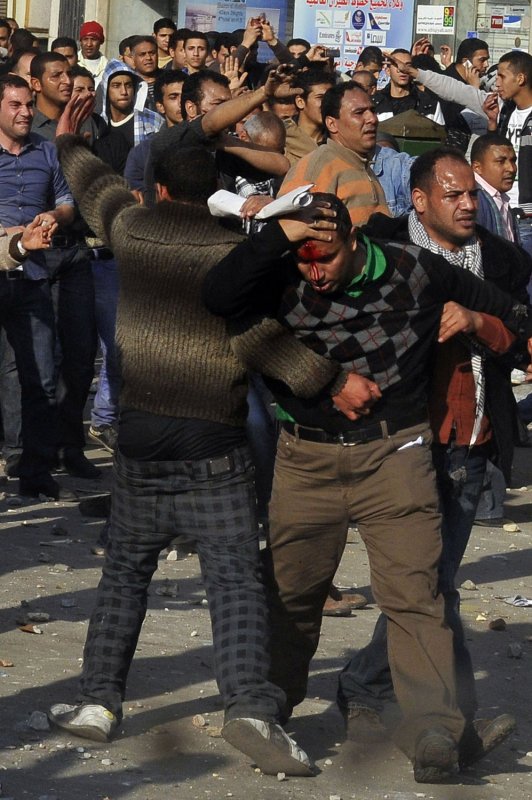1 of 9 | A wounded anti-government protester is escorted to a make-shift medical center during a clash with supporters of Egyptian President Hosni Mubarak in Tahrir Square, Cairo, Feb. 2, 2011. UPI |
License Photo
CAIRO, Feb. 3 (UPI) -- U.S. and Egyptian officials are discussing a proposal for President Hosni Mubarak to resign and cede power to a transitional government, U.S. officials said.
Under the proposal, Egyptian Vice President Omar Suleiman would lead the transitional government with the support of the nation's military, The New York Times reported Thursday, citing senior Obama administration officials.
The plan calls for Suleiman and Egypt's top military leaders to initiate constitutional reform, and for a transitional government to include representatives of opposition groups -- including the Muslim Brotherhood -- in an effort to reform Egypt's electoral system prior to elections scheduled for September, officials told the Times.
Senior U.S. officials said the proposal was one of a number of ideas being discussed with top Egyptian officials -- but not with Mubarak directly.
Mubarak said in an interview with ABC News if he steps down immediately, Egypt, wracked by more than a week of anti-government protests, would descend into chaos. He said Thursday he told U.S. President Barack Obama he is wrong to insist that now is the time for Mubarak to resign, saying Obama, though a "good man," does not understand Egypt or its culture.
Mubarak's comment came following a day of violent clashes between pro- and anti-government demonstrators that saw at least eight people killed. Thursday was the 10th day of protests. Anti-government protesters were promising even larger demonstrations for Friday.
Mubarak said this week he would not seek re-election in the fall and told ABC he never intended to pass the presidency on to his son, Gamal.
Mubarak, 82, who has been in power for three decades, said he is "sick" of being president and unhappy about the violence, ABC said.
"I was very unhappy about yesterday. I do not want to see Egyptians fighting each other," he said. "I don't care what people say about me. Right now I care about my country, I care about Egypt."
At the daily press briefing in Washington, White House spokesman Robert Gibbs repeated the administration position that "the time for the transition in Egypt is now" and urged the government "to ensure that peaceful protests can take place."
"I want to say a word for a second on the systematic targeting of journalists in Egypt," Gibbs added en route to Pennsylvania where Obama visited the Pennsylvania State University campus. "This also is completely and totally unacceptable. Any journalist that has been detained should be released immediately. I think we need to be clear that the world is watching the actions that are taking place right now in Egypt."
More than a dozen journalists have reported being attacked, including those working for the major U.S. networks and Britain's BBC.
Egyptian Health Minister Ahmad Samih Farid told state television eight people were killed and 900 injured in fighting that erupted Wednesday in Tahrir Square in Cairo and spilled into the early hours of Thursday, al-Masry al-Youm reported.
"Most of the casualties were the result of stone throwing and attacks with metal rods and sticks," GulfNews.com quoted Farid as saying on state television. "At dawn today there were gunshots."
Tanks surrounded Tahrir Square where anti-government protesters gathered and supporters of Mubarak were said to be heading once again to the area.
CNN said the army deployed soldiers to act as a buffer between the two groups Thursday.
Demonstrations also were reported in Alexandria, Suez and Ismailia governate.
Pro-regime supporters riding camels and horses, and armed with metal rods, sticks and stones charged into anti-government demonstrators in the square Wednesday. Gunshots were fired early Thursday as violence erupted and stones were hurled between the sides. Firebombs and rocks were hurled from the rooftops, al-Masry al-Youm said.
The newspaper reported Interior Ministry officials denied the pro-government demonstrators were actually police dressed in civilian garb.
Following the violence, the opposition Wafd party and other opposition groups refused talks with Suleiman, al-Masry al-Youm reported.















